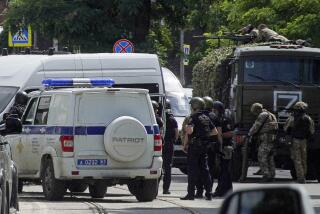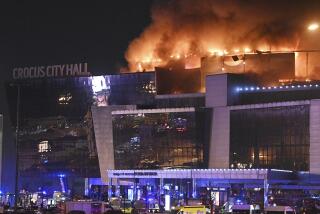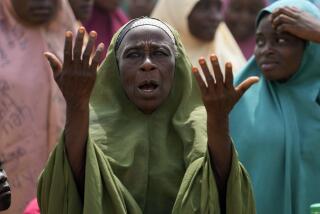Militants Were at Odds, Kidnap Suspect Says
- Share via
MOSCOW — An alleged participant in the seizure of a school in southern Russia said that after taking more than 1,000 hostages the militants fell out among themselves, with the leader killing three who opposed holding children, according to media reports Monday.
The suspect spoke on state-run RTR television and through a lawyer -- in a country where terrorism suspects rarely have legal representation so soon after being captured. That could indicate that the Kremlin wanted his story to be aired.
His statements could not be independently confirmed, and there appeared to be some inconsistencies between what he said on television and through his lawyer.
Meanwhile, Russia began the first of two days of official mourning for the victims of last week’s hostage seizure in the North Ossetian town of Beslan. The editor of Izvestia, a respected daily newspaper, was fired by his publisher Monday for having approved the publication Saturday of a dramatic photo spread of the tragedy’s victims.
Most Russian media, particularly television, produced restrained coverage of the final hours of the three-day ordeal, which ended Friday with explosions and fierce gun battles between hostage-takers and Russian commandos -- and the deaths of 335 victims and 30 militants. Flags flew at half-staff across Russia on Monday, in some cases with black ribbons tied around the poles. Rallies against terrorism, sponsored by public authorities, were scheduled for today in Moscow and other cities.
In Monday’s edition -- apparently the last under the leadership of Editor Raf Shakirov -- Izvestia raised questions about the official version of how the crisis came to such a bloody end.
The official account stressed that authorities had no plans to storm the school and that the final confrontation was triggered by unexplained explosions inside the building. Izvestia reported that its correspondents and a rescue worker said the clash began with shooting, possibly from outside, rather than an explosion inside the building.
“I think the sacking of Raf Shakirov was a public execution of an independently thinking journalist who tried to lead the public away from the fog of official lies,” said Oleg Panfilov, director of the Center for Journalism in Extreme Situations, a Russian group that advocates media freedom. “The authorities did this with brazen arrogance.”
The story put out Monday by Nur-Pashi Kulayev, the alleged hostage-taker in custody, lent support to the idea suggested by authorities and some surviving hostages that conflicts among the militants may have led to an explosion or explosions that triggered the shootout.
But Kulayev’s claims, as related on the Gazeta.ru website, focused on the initial stages of the crisis and the actions of the militants’ leader, known as the Colonel.
“According to Kulayev, right after the school was captured, there was a quarrel among the rebels, because many of them were unhappy that the children were seized,” the online news publication reported. “The Colonel, in order to establish order, personally killed the head of a group that was not happy with seizing children.” Then, to “drive home his threat,” he used a remote-control device to detonate the suicide bomb belts worn by two women among the hostage-takers, Gazeta.ru said.
Associated Press quoted Kulayev’s attorney, Umar Sikoyev, giving a virtually identical story. Sikoyev also said that the band’s leader did not explain the mission to all participants, AP reported.
Monday evening, RTR television news broadcast a brief statement by an alleged hostage-taker, who was not named but was apparently Kulayev, since he was the only uninjured male hostage-taker that authorities had acknowledged having in custody. According to Russian media reports, officials originally said they had captured three hostage-takers, then said the three in custody were only accomplices, and then said that two men were hostage-takers and a woman in custody was an accomplice.
In the brief statement on RTR, the accused militant blamed separatist Chechen leaders Aslan Maskhadov and Shamil Basayev for the assault.
“A man nicknamed Colonel gathered us in the forest, and they said: ‘You must seize a school in Beslan.’ They said that this task had been set by Maskhadov and Basayev,” the detained man said. “When we asked Colonel why we had to do this and what the objective was, he, Colonel, said: ‘Because is it necessary to unleash a war across the entire Caucasus.’ ”
It was not immediately clear how that statement could be reconciled with the idea that some participants opposed holding schoolchildren hostage, unless not all the militants were present at the meeting in the forest or they expected that only adults would be held after the school takeover.
The man’s statements broadcast on state television would seem to be politically favorable to President Vladimir V. Putin, since the Kremlin has sought to pin terrorist attacks on Basayev and Maskhadov -- a former president of Chechnya when it exercised self-rule in the mid-to-late 1990s. Authorities have also warned that the school attack must not trigger regional fighting between the predominantly Russian Orthodox people of North Ossetia and the Muslims of neighboring areas, including Chechnya and Ingushetia.
Shakirov, the dismissed Izvestia editor, said the restrictive media policy reflected in his firing “will eventually result in the president getting more and more one-sided information, and hence making more and more mistakes in the future.... I was sacked for the Saturday issue. The explanation boiled down to the idea that we overreacted to the Beslan events and presented the news in such a light as if the country were at war.
“But we are at war,” he said. “And the public should be awakened to it despite very passive television coverage. Oddly enough, BBC and CNN devoted more time to live coverage of what was going on in Beslan than Russian national channels.”
Times staff writer Sergei L. Loiko contributed to this report.
More to Read
Sign up for Essential California
The most important California stories and recommendations in your inbox every morning.
You may occasionally receive promotional content from the Los Angeles Times.










